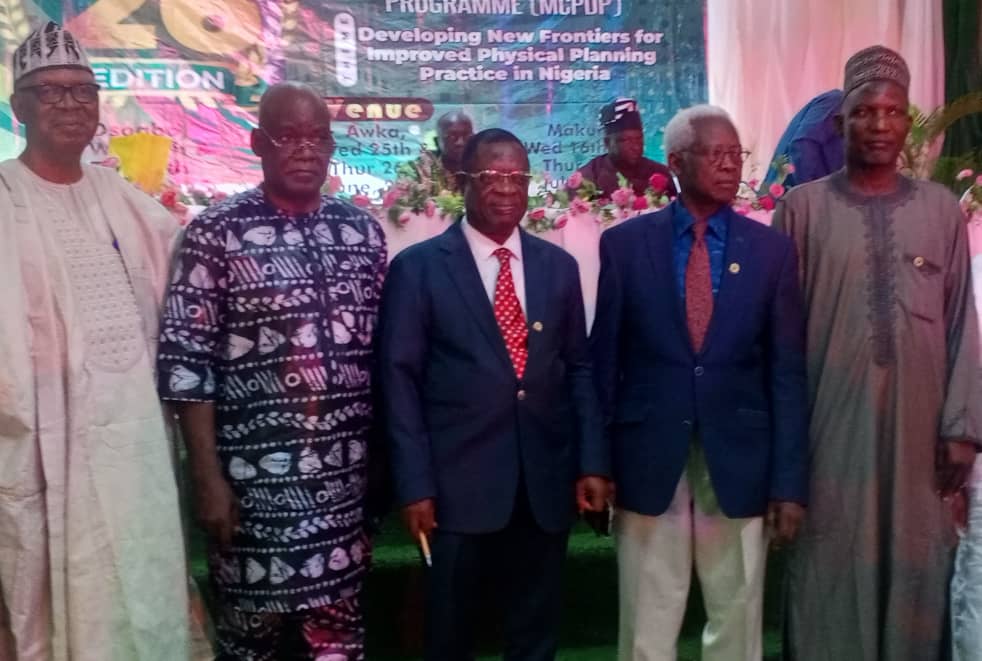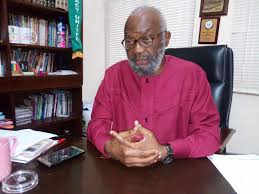Uncategorized
ITF Unveils New Strategic Policy Direction for 2022 – 2025

The Industrial Training Fund (ITF), has unveiled a new strategic policy direction for 2022 – 2025 aimed at more effectively delivering on its mandate.
Director-General/Chief Executive of the Industrial Training Fund, Sir Joseph Ari disclosed this at a media briefing in Jos, Monday.
“This Strategic Policy Direction is the third of such plans by the incumbent administration in the Industrial Training Fund (ITF).
You will recall that on assumption of office in 2016, we unveiled the ITF Reviewed Vision: Strategies for Mandate Actualization.”“The plan, which was initially slated to terminate in 2022, was, however, reviewed in 2020 to address gaps that were identified in the course of its implementation, and for us to appropriately respond to the negative impact of the COVID-19 Pandemic on our numerous clients,” he said at the briefing.
He said the extant plan enabled the ITF to aggressively address service challenges by computerizing its operations, tackling infrastructural challenges to expand access to Nigerians desirous of acquiring skills, and generally address a gamut of other strictures that were impinging on its ability to effectively discharge its mandate for National economic growth and development and the general good of the Nigerian people.
He however, lamented that, “Despite the numerous achievements recorded by the Fund on account of these initiatives, we have realized that more needs to be done if we must fully tackle the numerous socio-economic problems that are bedevilling us as a Nation.”
He further stated that, “unemployment in Nigeria today is at over 33% as over 23 million Nigerians that are desirous to work cannot find jobs, mostly because of the absence of requisite skills.
“Poverty is equally on the rise with some estimates placing the number of Nigerians that are living in poverty to be over 90 million. In the face of all these, our population has continued to soar with the World Bank estimating that Nigeria might hit 216 million by the end of this year.
“Equally worrisome is the spectre of the Out of School Children, which according to the United Nations Children Fund (UNICEF) is projected to be over 18.5 million.”
“It is based on the above and in line with our mandate of developing a vast pool of skilled manpower sufficient to meet the needs of the public and private sectors of the national economy coupled with resolutions at the recently concluded ITF National Skills Summit in Abuja that we found it imperative to review and refocus our strategies to address the above challenges and to meet the skills requirement of the nation in line with global best practices.
“In arriving at our strategies, we considered the need to scale up our activities to address the soaring unemployment and other socio-economic challenges by leveraging on our three Es (Experience, Expertise and Expansive network), deployment of technology for wider coverage and more flexible service delivery.”, Ari explained.
The new policy framework, which has as its theme: Re-Engineering Skills for Sustainable Development according to Ari, has external and internal components;
The ITF Boss further said that, “The internal components of the plan, which entail value reorientation, Industrial Development, Commercialization of ITF Facilities, Alternative Funding Window, Deployment and Promotion, Annual Budget Preparation and, Revenue Generation are intended to drive the external components of the new policy direction, which covers Standardization and Certification, Technical and Vocational Skills Training Programmes, Skills Intervention Programmes, Electronic and Virtual Learning and, Optimal Utilization of Skills Training Centres (STCs) and Vocational Wings (VWs). ”
According to him, he further revealed that, ”Standardization and Certification as the core aspects of the Mandate of the Industrial Training Fund, specifically, Section 2 subsections c and d of the ITF Act 2011, vest the ITF with the responsibility to set training standards in all sectors of the economy and monitor adherence; and evaluate and certify vocational skills acquired by apprentices, craftsmen and technicians in collaboration with relevant organisations.
In this area, the Fund will focus on ensuring full adherence to standards and regulating vocational skills training outfits through the accreditation of skills training centres and certification of all skills training in line with the Act.”
To actualise this, he said that, “the Fund will develop National Occupational Standards (NOS); Evaluate and certify apprentices, technicians and craftsmen; Train and certify learning and development professionals and; Create and maintain a data bank on skills training.”
Another key area of the Fund’s mandate, the ITF Boss said, “is the Technical and Vocational Skills programmes.
”Despite our commendable achievements in this regard, the Fund is set to refocus Technical and Vocational Skills Training for employability and economic growth by facilitating the institutionalization of the National Apprenticeship and Traineeship System (NATS).
”To actualize this, the Fund will collaborate with relevant public and private stakeholders for NATS; appraise and harmonize Apprenticeship programmes in line with set guidelines; conduct monitoring and evaluation and; design and develop technical and vocational skills programmes in line with the needs of the economy.
Saying that, “When fully in place, our plan will ensure a pool of highly skilled indigenous apprentices, technicians and craftsmen as well as an institutionalized National Apprenticeship and Traineeship System (NATS). ”
”Cognisant of the fact that technical skills are integral to the growth and development of societies across the globe, the incumbent management since its assumption of office in 2016, has been committed to equipping Nigerians with technical and vocational skills for employability and entrepreneurship.
”In this regard, to further address the problems of rising unemployment and under-employment, the Fund is re-engineering its skills intervention programmes through National Apprenticeship and Traineeship System (NATS).
”To achieve this, the Fund will register as a super certification centre; extend the duration of skills intervention programmes in line with NATS (six months for traineeship and one year for apprenticeship); procure and provide start-up packs for trainees in the succeeding year; design and develop skills intervention programmes; identify and engage accredited Skills Training Centres and certified craftsmen; implement, monitor and follow up intervention programmes and; evaluate and certify trainees.
“The intended outcome of this strategy is to have at least a total of 27,000 skilled and employable youths (18,000 trained youths under the NATS and 9,000 youth under the NISDP and other intervention programmes) and increased SMEs and Entrepreneurs to meet the Nation’s economic needs.”
“In this area, the Fund will provide the enabling environment to foster creativity, innovation, entrepreneurship and employability through its skills training centres by:
“Upgrading three of its skills training centres to Centres for Advanced Skills Training for Employment (CASTE)
“Embedding production Hubs, Skills/e-Hubs as well as creative and innovative hubs in its Skills training Centres and Vocational wings and,
“Utilizing existing skills training Centres to develop the capacity of technical instructors.
“In this regard, the Fund will equip Training Centres with state-of-the-art facilities, partner with relevant stakeholders for training placement as well as identify the competitive advantage of the centres for production purposes. We will also introduce instructors’ training in three (3) designated Skills Training Centres, advertise and deploy the Centre’s facilities and equipment for commercial use, engage trainees in the design and development of products and establish creative and innovative clinics. In addition, it will develop entrepreneurs and rename all Industrial Skills Training Centres as ITF Skills Training Centres (ITF STCs).
“With this strategy, we will now have three (3) Centres for Advanced Skills Training for Employment (CASTE) in Lagos, Kano and Jos as well as well-equipped training centres and vocational wings; train 450 Instructors annually; maximize investment and improve our revenue base.
“We believe that the new Policy framework if fully implemented will place us in better stead to fully implement our mandate and drive the achievement of Federal Government’s goals with particular reference to unemployment, poverty and their associated consequences.
“Our belief is premised on the fact that countries all over the world that had dealt with and have successfully solved the problems that we are currently confronting today, did it through a greater commitment to skills acquisition.
“For instance, to handle its youth bulge in the 70s and 80s, China under the leadership of Mao Zedong, Hua Guofeng and Zhao Ziyang who ruled the country during that period, invested heavily in the capacity development of its people. The outcome of this investment is evident today as China has moved from near third world to the 2nd largest economy and one of the most industrialised countries on earth.
“In Germany, about two decades ago, there was mass unemployment with roughly five million unemployed people and low employment rates to the extent that it was labelled “the sick man in Europe”.
“Today, nearly two-thirds of young Germans are enrolled in apprenticeships once they leave full-time education using the German Dual Vocational and educational training (DVT), nine out of ten young trainees get a permanent job at the end, with others being offered shorter-term contracts.
“Germany is now dubbed a job wonderland and European champion with regard to its high employment rates. We believe that we can replicate similar successes in Nigeria giving greater commitment to skills acquisition that is considered by many today as the currency of the 21st Century.”
Uncategorized
Controversial Oil Wells: Akpabio’s Outburst Reckless – Philip Obin

By Mike Odiakose, Abuja
Special Adviser to the Governor of Cross River State on Digital Economy and Technical Assistant on New Media to former Vice President Yemi Osinbajo, Philip Obin, has described the recent public outburst by Senate President Godswill Akpabio is not only unfortunate, but also unprecedentedly inciteful.
Obin said in his social media handle that such utterances, coming from the nation’s number three citizen, carry the dangerous potential of igniting tension—even outright violence—between two sister states, Cross River and Akwa Ibom. “This is reckless and deeply disappointing.”For historical context, Cross River State is one of Nigeria’s oldest federating units, created in 1967 (originally as South-Eastern State) and renamed Cross River in 1976. “Akwa Ibom State, on the other hand, was carved out of Cross River State on September 23, 1987, by the Ibrahim Babangida-led military government. “As such, Akwa Ibom is not only our geographical neighbour but also our “younger sister” in both administrative and historical terms.”It is ironic, then, that Cross River—a state that gave birth to Akwa Ibom—has suffered the loss of 76 offshore oil wells to this younger sibling under highly controversial circumstances. “These oil wells were once a vital source of revenue and development for Cross River, contributing significantly to its federal allocations before their loss. Since the 2012 Supreme Court ruling, Cross River’s allocation dropped by over 40%, plunging the state deeper into economic hardship.”In spite of the economic hardship caused by the loss of the 76 oil wells—an act many still believe was politically engineered to Cross River’s disadvantage—our people have chosen the path of peace. “Cross River has demonstrated maturity, restraint, and exceptional neighbourliness towards Akwa Ibom. “We have maintained friendship and extended the hand of brotherhood, even while pursuing justice through peaceful and legal means.”This is why it is deeply troubling to see both the Akwa Ibom State Government and the Senate President engage in coordinated attempts to silence any conversation around redress, using the Supreme Court ruling as a final seal to shut down dialogue. But justice is not always only a legal conclusion—it is also a moral one.”Yes, the court ruled in 2012, but the pain and sense of injustice remain fresh among Cross Riverians. The fact that we lost our maritime boundary due to a federal action (the ceding of Bakassi to Cameroon) does not justify the further economic punishment of our people. “A political solution remains the most honourable and sustainable path forward—one that acknowledges the complexity of the situation and respects the sacrifices of Cross River.”Let it be clear: calls for a review or political settlement are not acts of provocation; they are calls for equity. “Rather than dismiss these legitimate concerns with arrogance, leaders—especially at the national level—should promote dialogue and healing, not division and threats.”The hate and condescension in Senator Akpabio’s utterances will not intimidate us. They will only strengthen our resolve. “The people of Cross River may be peaceful, but we are not weak. We demand justice, and we will continue to pursue it—peacefully, lawfully, and fearlessly.”Uncategorized
Financial Scandal: Ebonyi Indigenes demand Sack of SSG Over Diversion of State Resources

… Give Governor Nwifuru 48 Hours Ultimatum
By Mike Odiakose, Abuja
Following a reported Court order ordering the interim forfeiture of alleged one billion naira (N1 billion) diverted by the Secretary to the Ebonyi State Government (SSG), Prof Grace Umezuruike, a governance and accountability platform, the Association of Ebonyi Indigenes Socio-Cultural in the Diaspora (AEISCID) on Tuesday demanded immediate sack of the state SSG by Governor Francis Nwifuru.
The Ebonyi group also condemned the state government’s posture the reported case.
At the weekend, an Uyo Division of the Federal High Court had ordered interim forfeiture of over N1 billion allegedly diverted by the Secretary to the Ebonyi State Government (SSG), Grace Umezurike, and her aide, Ngene Nwanna Onyeabor.
The judge, Maureen Onyetenu, granted the forfeiture order on 8 July, according to a court document obtained by a prominent online newspaper.
The court order followed an ex parte application filed by the Economic and Financial Crimes Commission (EFCC).
Reacting to the development, the Diaspora group wondered how such humongous corrupt practice happened in a state like “Ebonyi where abject poverty walk on the streets stark naked and it took a conscious social critic, Nwoba Chika Nwoba to petition the anti-graft agency before it acted and froze the said accounts with an order to conduct discreet investigations into the matter is not for us a very big issue.”
In a statement signed Tuesday by AEISCID President (Worldwide), Ambassador Pascal Oluchukwu, asked Governor Nwifuru to immediately drop his SSG within 48 hours for a thorough, discreet and unhindered probe by the anti-graft agency.
According to the group, cases of corruption has been more prevalent in the current leadership of the state under Governor Nwifuru- “arguably more than all the past administrations since the return of democracy combined.
“We ask: What else does the Governor who claims to be a lawyer need to understand that once a prima facie case has been established leading to the freezing of the said accounts by the anti-graft agency for a possible forfeiture of the diverted funds to the Federal Government, the SSG should have been asked to step aside immediately?
“This is a common ethical and standard practice that is well in accordance with the principles of transparency, accountability and probity in governance which would ensure that all allegations are substantiated without let or hindrance using the privileges and rights of powerful office she occupies and connections of some powerful people in government.
“We are thoroughly ashamed of the disposition of the State government towards this grave allegation that has very severe and negative consequences for the State and Ebonyians home and in the diaspora.
” This is why we ask Governor Nwifuru to immediately drop his SSG within 48 hours for a thorough, discreet and unhindered probe by the anti-graft agency. We further admonish the government to show cause by entering to be joined as a party in the suit before the Federal High Court so that in any event the loot is proven to be that of the State, the government can easily reclaim the funds and deploy same for the benefit of the common masses.
“Already, apart from the pervasive poverty biting the common Ebonyians that one could literally cut through with a knife, there are many projects started by this administration which are yet to receive the needed attention obviously due to the same grand-scale corruption that has been the order of the day that the said money can effectively be ploughed back into.”
The group, however, called on the EFCC to widen its nets to help Ebonyi people recover loots allegedly diverted by contractors within the last two years of the present administration and the past eight years of Umahi-led administration.
“AEISCID would like the EFCC officials and the people alleged to be involved in this heinous financial crime which has gone on in our dear State for over a decade to know that our eyes are consistently on them and we would follow through this matter till all the funds are not only recovered but those responsible for the alleged diversions are consequently brought to book.
“We are fully aware of the fact that Ebonyi cannot breathe because former Governor Umahi is still holding the State by the neck and his successor strongly by the balls.
“This is not only about Nwifuru’s government and its appointees who have allegedly been amassing wealth from the public coffers. It is certainly about a people and their collective destiny to save their State from shame and eventual doom!”
Uncategorized
Town Planners Task Benue Govt On Regional Devt, Master Plans

By David Torough, Abuja
The President, Nigerian Institute of Town Planners (NITP), Dr. Chime Ogbonna, has urged the Benue State Government to urgently undertake a comprehensive regional development plan and master plans to begin implementing long-overdue urban planning policies across the state.
He made the call on Wednesday in Makurdi during the opening ceremony of the 26th Mandatory Continuing Professional Development Programme (MCPDP), hosted by the NITP in conjunction with the Town Planners Registration Council of Nigeria (TOPREC).
Addressing town planning professionals from across the country, Dr. Ogbonna decried the glaring shortfall of town planners in Benue and the administrative confusion surrounding physical planning in the state.
“From what we saw during the town hall meeting, there’s a dangerous absence of coordinated planning,” he said. “The Benue State Government needs to develop and implement a regional plan for the entire state and establish master plans for all urban areas.”
He warned that without deliberate planning, even small settlements in Benue state, which are bound to grow into urban areas will culminate into chaotic development. “Planning is not just for Makurdi. Every settlement, no matter how small, deserves a guide for growth,” he emphasized.
Dr. Ogbonna also advocated for the full implementation of Nigeria’s 1992 Urban and Regional Planning Law, saying it is the only way to ensure equitable and sustainable development across Benue’s urban and rural areas.
In a keynote address delivered on behalf of the President of TOPREC, Isyaku Muhtar Kura, the council’s representative, Tpl Prof. Timothy Gyuse, emphasized the need for innovation in tackling emerging urban planning challenges.
He described the MCPDP not just as a statutory event but also a platform to equip planners with modern tools, strategies, and collaborative approaches for building resilient communities.
“This training must go beyond routine. It’s a call to prepare for a future where sustainable cities become the norm,” he said.
The program has been billed to take place this year in three venues namely: Osogbo, Awka, and Makurdi. Osogbo and Awka have already hosted the programme while Makurdi is now hosting the 3rd and final leg of the programme.
Declaring the event open, Governor Hyacinth Alia, represented by the Director-General of Benue Geographic Information Service (BenGIS), Prof. Daniel Amine, welcomed the dialogue and promised government action on the planners’ recommendations.
“If you don’t plan, you will plan to fail,” Prof. Amine asserted. “This workshop has raised critical issues. We will expect formal communication from your institute, and we shall present it to the governor for prompt action.”
Prof. Amine praised Governor Alia’s commitment to urban development, noting that three senior staff of the BenGIS are certified town planners.
However, he cautioned against unregulated construction in the state. “If we allow people to build wherever they want, one day you may not even be able to drive out of your home,” he warned.
Amine also challenged NITP and TOPREC to hold their members accountable, especially those who contribute to planning irregularities. “Your institute must be ready to sanction planners who cause confusion,” he added.
In his remarks, the chairman of the MCPDP planning committee, Dr. Osunsanmi Gbolabo, expressed gratitude to participants and reiterated the historical importance of the training.
He said the MCPDP, now in its 26th year, has evolved to meet the dynamic demands of the profession. “We are not just shaping spaces; we are shaping futures,” he said, highlighting new syndicate sessions and smart training methods introduced to enhance the learning experience.
Several other speakers took the stage, including Dr. Jesse Nor, NITP’s National Public Relations Secretary, emphasized that the MCPDP is a vital platform to sharpen skills and improve planning outcomes in Nigeria’s growing cities.
“For this year, Makurdi was chosen among the other three venues to host the program. The Makurdi venue is thus the last leg of the program for the year.
Indeed, the MCPDP is a gathering of city planners to explore new frontiers of knowledge, training, and skill development, and how all of these influence planning practice and with the overarching aim of developing our towns, regions and cities in a sustainable manner”, he stated.
A highlight of the event was a paper presented by by Dr Osunsanmi Ogbolabo, on behalf of Prof. Ayo Olajuyigbe, of the Federal University of Technology, Akure, who traced the origins of town planning from ancient civilizations to contemporary practices. He stressed the need for financial and political will to enforce master plans, pointing to widespread violations due to weak implementation and institutional gaps.
In another presentation, Tpl Patrick Nyame, on behalf of Dr. Daniel Adamu from Nasarawa State University, advocated for strategic synergy between governments, ministries, private sectors, and non-state actors.
“Collaboration is not weakness; it’s wisdom. Government alone cannot achieve the level of development we seek,” he said.
The MCPDP, which began with a town hall meeting on Tuesday, will run through Thursday, featuring further presentations and roundtable discussions aimed at addressing Nigeria’s growing planning concerns and generating policy-focused solutions for sustainable development.
| ReplyReply allForwardAdd reaction |


























